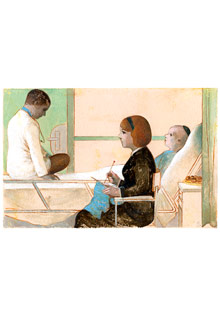A Leap of Faith

Illustration: Gerard Dubois
As a physician, Kent Sepkowitz is a rational man of science. But a question posed by a patient's mother revealed that science isn't everything.
I recently helped care for a child with leukemia. He was a sweet, thin-boned kid, hairless and pale from chemotherapy, with dark Lillian Gish eyelids. He and his family were Orthodox Jews and he wore a yarmulke, holding his neck perfectly still so the cap wouldn't slide off his bald head.The boy's parents and various siblings were usually in the room with him. Electric candles sat near the refrigerator; here and there were cookies and rolls wrapped in plastic. The family spoke carefully and was clearly familiar with his health issues, particularly the mother. She noticed everything, wrote nothing down, and weighed new information with surprising detachment.
The child never had a good day. Fevers and cough, and scan after scan, week after week. The family, though, remained patient and polite, every day offering me a nibble of food, maybe a little something for later too.
One afternoon, I lingered a bit longer than usual. The little boy was playing a video game with intense focus—a testament to the ability of a video game to distract.
The mother was the only other person in the room. She was busy knitting. "So no good news for me today?" she asked.
"I guess not."
"Nothing at all?"
"Don't ask," I replied, smiling. During the hospitalization, "don't ask" had become my shorthand to indicate the latest information was nothing but a tangle of confusing test results that revealed nothing useful—a fairly common state of affairs.
She noticed I was watching her son. "He's something, yes?"
"Of course."
After a long pause she resumed. "You wonder how I can stand this." The sun through the window made her skin appear whiter, almost spectral. "What sort of God would do this to my baby?"
"Actually," I said cautiously, "I do wonder." Indeed, I have spent a considerable amount of time trying to reconcile the irreconcilable fact of children with cancer. For years my office was several floors above the pediatric clinic in the cancer hospital where I work. Every morning the kids would enter the elevator with me—bald ones wearing New York Mets caps, babies with intravenous catheter bags hooked onto their strollers, teenagers on crutches. The woman's boy was merely the latest addition to my dark confusion about kids and cancer.
She shrugged. "Who knows?" she said. "Not me." She returned to her knitting. "We don't know what God intends."
I said nothing.
She stared up at me, perhaps a bit steamed, and said, "You wanted a fancier answer? A big revelation?"
"No," I said. "I just...you know."
The boy was still locked in his game, calmly ignoring whatever the adults were discussing. His mother scanned me up and down. "You aren't observant?" she said.
"Not really."



